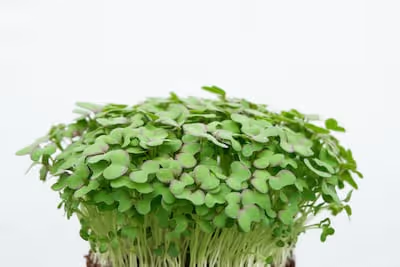Watering Herbs Correctly for Healthy, Thriving Plants

Watering Herbs
Watering herbs properly means watering deeply, less often, and always letting the soil dry slightly between sprinklings. Avoid soggy conditions by checking with your finger: if the top inch feels dry, it's time to water your herbs again. Ensure containers have good drainage holes—healthy roots despise standing water—and you'll keep savory basil, vibrant cilantro, and pungent rosemary thriving season after season. Here's how to master the gentle art of watering herbs.
🌿 Herb Watering Cheatsheet: Healthy Herbs, Every Time
💧 Watering Frequency & Amount
- 🌡️ Check topsoil (2.5cm / 1 inch): Dry? Water herbs fully.
- 🕒 Timing: Early morning watering reduces evaporation risk.
- 🍃 Typical needs: Outdoor herbs (weekly deep soak), Indoors (small sips every 2–3 days).
🪴 Containers & Drainage Tips
- 🚿 Drainage: Use pots with holes, avoid soggy roots.
- 🌿 Pot material: Terracotta dries quicker, ceramic retains moisture longer.
☀️ Environment & Seasonal Adjustments
- 🔥 Summer: Herbs need water 1.5–2× weekly in high heat (above 85°F / 29°C).
- ❄️ Winter: Indoors—water less, slower plant growth.
🚩 Signs & Symptoms of Water Issues
- ⚠️ Overwatered: Yellow leaves, moldy soil, wilt despite moist soil.
- 🥀 Underwatered: Crispy leaf tips, wilting with dry soil.
🍃 Quick Watering Methods
- 🫧 Watering Can: Controlled, steady pour.
- 🌧️ Bottom Watering: Pots in tray, soak roots for ~15 minutes.
- 🌫️ Misting: Supplement only, doesn't replace regular watering.
🥗 Nutrient Benefits & Homegrown Goodness
- 🌱 Proper hydration boosts herb essential oils, flavor, nutrition density.
- 🥙 Fresh herbs harvested at home contain higher vitamins and antioxidants compared to store-bought.

The Art of Watering Herbs: Essential Techniques for Thriving Plants
Watering herbs seems straightforward enough—but trust me, overwatering basil feels like drowning a gourmet dinner in ketchup. I've learned through trial, error, and a few heartbreaking rosemary funerals that watering herbs needs finesse.
Know Your Herb's Personality
Every herb has distinct watering preferences, shaped by their origins. Mediterranean herbs—I'm looking at you, oregano and thyme—prefer drier, less frequent watering.
Mint, dill, and parsley, however, enjoy a more regular drink, akin to our morning coffee ritual.
Grouping herbs with similar thirst levels together keeps everyone content, preventing unintended casualties.
Check Soil Moisture Like a Pro
Forget rigid schedules—herbs hate conformity. Instead, use the finger method: push your finger about an inch (2.5 cm) into the soil.
- If it feels dry, water moderately until moisture seeps out the drainage hole.
- If damp, step away, resisted the urge, and let it be.
Overwatering causes root rot faster than you can say "pesto disaster."
Timing Makes the Difference
I usually water my herbs early in the morning, just as the sun rises and before the heat sets in. This helps the herbs absorb moisture without risk of fungal diseases that nighttime watering can encourage.
"Morning watering reduces evaporation rates by almost 30%, ensuring efficient hydration for your herbs." – Gardening Studies Review
Watch the Leaves, But Water the Roots
Spraying water all over herb leaves might seem refreshing, but it's a sneaky way to invite diseases and fungus. Always aim directly at the soil around the base of the plant, keeping those delicate leaves dry.
Perfecting Your Watering Technique
There's an art to watering herbs. Gently and deeply is the mantra.
Pour water slowly, allowing soil to absorb it evenly and deeply. Quick watering sessions merely wet the surface, leaving roots thirsty and dissatisfied.
The Magic of Mulch
Mulch has always been my quiet ally in herb gardening. A thin layer of organic mulch—like straw or shredded leaves—keeps moisture locked in, reducing watering frequency and providing cozy protection for the roots.
Consider Container Choices
If your herbs reside in pots—ceramic, terra cotta, plastic—be alert. Terra cotta absorbs moisture faster, needing more frequent attention.
Plastic retains moisture longer, so adjust your watering habits accordingly to prevent soggy mishaps.
Drainage Is Non-Negotiable
Herbs detest soggy feet as much as I loathe soggy pizza crust. Always ensure your herb pots have ample drainage holes to let excess water escape freely.
Unused water accumulating at the pot's base is a surefire path to disaster.
Adjust for Weather and Season
Hot summers in my garden mean watering herbs more generously, sometimes even daily during heatwaves (above 85°F or 29°C). Conversely, cooler months reduce thirst significantly—weekly watering often suffices.
Adapt to seasonal shifts, paying close attention to soil moisture, not just calendars.
Let Herbs Teach You the Way
Ultimately, herbs communicate clearly—drooping leaves, yellowing tips, or wilting signal distress. Pay close attention to these subtle cues, adjusting your watering practice accordingly.
"Gardening is conversation—plants speak, attentive gardeners listen and respond." – Anonymous Gardener Wisdom
Mastering the delicate balance of watering herbs takes patience, observation, and a bit of humor when things inevitably go awry. Keep practicing, stay observant, and your herbs will reward you generously, season after flavorful season.
Frequently Asked Questions About Watering Herbs
How often should herbs be watered?
Watering herbs depends largely on their environment and soil type. Established herbs typically thrive with watering once every 5-7 days. Let the top inch (2.5 cm) of soil dry out before rehydrating. During warmer months or dry periods, herbs grown in pots or raised beds may need hydration every 2-3 days.
What's the ideal time of day to water herbs?
Provide water to herbs early in the morning between 6 and 10 a.m. Morning watering allows foliage ample time to dry before evening, minimizing conditions favorable to fungal disease. Avoid watering during midday heat to reduce rapid water evaporation and prevent leaf scorch.
Can herbs be overwatered?
Yes, herbs are vulnerable to overwatering. Too much hydration drowns roots and invites fungal growth or root rot. Ensure proper drainage, and water only when the soil surface feels dry to touch. Terracotta pots with drainage holes help avoid standing water issues.
Should herbs be watered from above or below?
Bottom watering helps provide hydration directly to herb roots, minimizing foliage dampness and reducing disease risk. If bottom watering isn't feasible, gently water herbs at their soil base, avoiding wetting the leaves excessively.
Is rainwater beneficial for herbs?
Rainwater naturally suits the hydration needs of herbs, free from chlorine and often slightly acidic—ideal for most herbs. Collect in barrels or buckets and use it to irrigate your herb plants as a sustainable watering alternative.
What are signs herbs may need more water?
Look for wilting, curled, or drooping leaves, or slow-grown yellowing foliage—these indicate herb plants need additional hydration. If dry soil at depths beyond one inch (2.5 cm) matches these signs, water herbs thoroughly and monitor for recovery.
How does container size impact watering frequency?
Smaller containers dry out more rapidly and demand frequent watering, sometimes daily during hot conditions. Larger containers hold moisture longer, so watering intervals naturally lengthen, usually every 4-7 days depending on weather.
Should watering frequency change with seasons?
Yes. During active growing seasons—late spring through summer—herbs typically require increased hydration. In cooler months, reduce watering frequency considerably, as most herbs' growth slows significantly, and evaporation rates are diminished.
Watering herbs is about balance and intuition—too little means wilted misery, too much equals soggy tragedy. Know your herb, touch the soil, and watch closely for thirsty signs. Water at the root, keep leaves dry, and ensure proper drainage—simple habits that keep your herbs thriving. Master these basics and you'll savor fresh, vibrant herbs season after season.
Find out which plants will thrive in your garden!
Answer a few fun questions and get custom plant recommendations perfect for your space. Let’s grow something amazing together!

start your season





